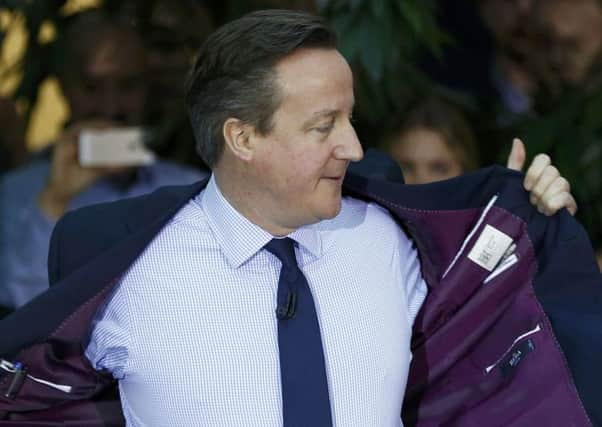Hannah McGill: PM's fashion advice to Jeremy Corbyn reflects lingering prejudices


Ignoble and jarring though his remark indubitably was, reactions seemed to suggest that we should all be above making personal jibes about people – not an instinct that has ever protected Cameron himself from being assailed by his detractors on the basis of his posh background or his big shiny face.
The uncomfortable fact is that we all do it. And sometimes there’s a basis to it. One could argue, after all, that Donald Trump’s ability to convince himself that what’s on his head looks like hair says something about his relationship with reality. Or that something can be deduced about Sarah Palin’s moral consistency from her shouting about wasteful elites while clad in designer spangles and standing next to a billionaire.
Advertisement
Hide AdAdvertisement
Hide AdSo, are certain schoolyard-style insults acceptable – even deserved – and others not? To some, the significance of the Prime Minister’s foray into fashion criticism was that he was class-shaming Leader of the Opposition – but what sort of class-shaming can really occur between two well-educated, highly-paid, London-property-owning products of the public school system? “Your boarding school was a bit less posh than mine”? “The organic artisanal coffee your wife sells is only £10 a bag, whereas Samantha’s handmade luxury notebooks go for £200?” It’s hardly Blur v Oasis.
Others claimed that it was the context – during Prime Minister’s Questions – rather than the content of the insult that matters. In questioning Corbyn’s respect for Westminster formality, Cameron was himself flying in the face of Westminster formality, claimed a lot of people who frequently pronounce themselves to be appalled by Westminster and its formality!
Beyond the kneejerk affront, what Cameron wanted to insinuate was that Corbyn’s relative slovenliness makes him suspicious all around. Too slapdash and hippyish to be trusted by proud working-class people. Too grimly self-righteous to relate to and mingle with foxhunters and tax avoiders. Not ambitious about looking fancy, therefore not ambitious for Britain. Far from being a slip, as some suggested, it was a targeted effort to play to a large, vague set of prejudices, in all of which style looms large over substance – and is particularly effective against an opponent who can’t react in kind, because his brand is built in part on being more decent than what he’s up against.
Cameron, meanwhile, must maintain the delicate balance of his own posh-but-not-too-posh image. He likes to claim he “doesn’t care about clothes” and buys his suits at Marks & Spencer; but according to rumour, his tastes run a little more bespoke. Thus arises the delicious notion of Savile Row tailors having to make their suits look as high street as possible, the better to cater to the demands of a political system both in thrall to and in denial about personal wealth.
Flights of fancy
Tinder, the dating app whereby people source profound experiences of human connectedness, has revealed the jobs that attract the most right swipes. (Right swipes are expressions of interest, apparently. I don’t know about this stuff; I got together with my partner via Facebook, like an old-fashioned traditionalist.) Women want to go out with pilots, who are away from home all the time hanging out with flight attendants, so that’s definitely going to work out well. TV/radio personalities also rate highly, because if celebrity culture has taught us anything it’s that people in the public eye are excellent at relationships. Men want to go out with physical therapists, which is either a euphemism, or the result of collective unresolved feelings about Daphne from Frasier. Speech language pathologists are number seven on the men’s list, ahead of nurses or flight attendants. What does this mean? That people keen on internet dating all really, really want to learn to communicate better? Or that there’s one phenomenally attractive speech language pathologist on Tinder whose popularity is throwing the data off?
A second slice of life
Some fictional characters come to seem like friends. Some are too horrible to shake off. And some get reinvented – rebels can turn conservative, as in the Catch-22 sequel Closing Time, or goodies show a darker side, as in the To Kill A Mockingbird prequel Go Set A Watchman. What about this: That philistine hard man, Trainspotting’s Francis Begbie, as a darling of the art world? Irvine Welsh hinted on this direction in a 2013 short story; now the novel The Blade Artist depicts in full Begbie’s second act. Whatever next – Spud finding his calling working in the leisure industry? «